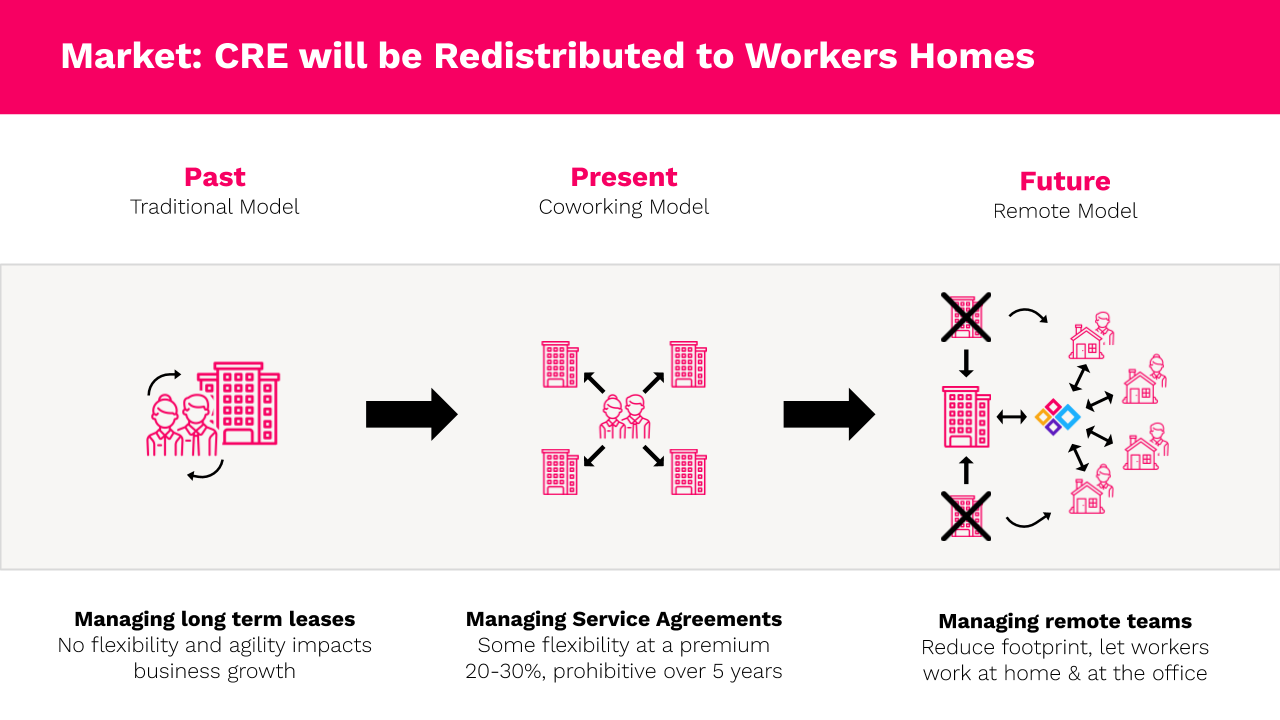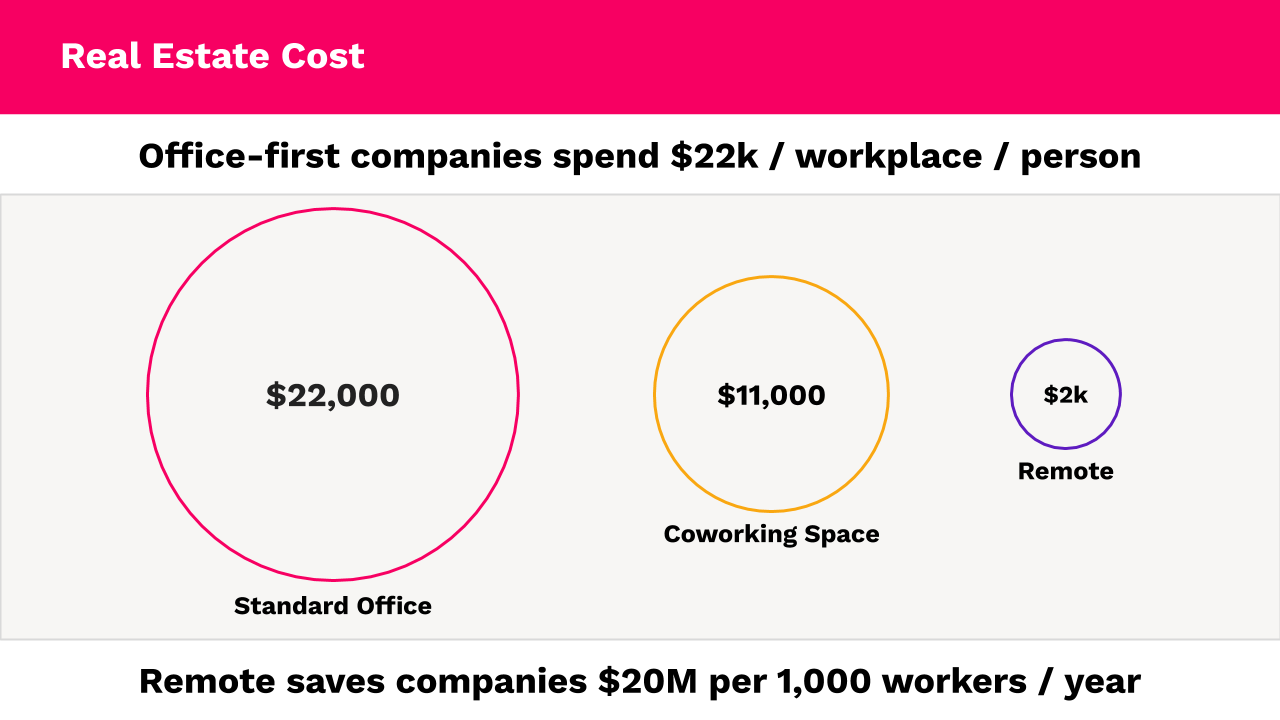How Offices Became Adults Kids Clubs
March 22, 2020


Remote work accelerated by 10 years in 10 days.
Prior to COVID-19 there were projected to be 33m full-time remote workers in 2030, across the EU and the USA. That’s how many there will be today after COVID-19 is over.
Now, by 2030, there will be 72m full-time remote workers across the EU and the USA. The problem is that the catalyst has been a global pandemic.
Companies have been left understandably unprepared and are struggling to know why and how to make the transition to being more remote, efficient and easy.

There is a massive change in thinking happening in the biggest companies in the world right now because of this. Now, everyone knows remote work works the risk has shifted to not leveraging the benefits of remote to build more resilient companies.
- 74% of CFO’s will transition to offer more full-time remote roles after this.
- The biggest enterprises on the planet will cut real-estate footprint by 50%.
- There would be a $1.8T/yr saving on real estate in the US alone if this happened

The evolution of real estate has always been dictated by cost rather than what’s best for workers getting work done. It started out as the optimum place to get work done. It's become the worst place to do deep focussed work.
Remote returns us to the past. Giving everyone the isolation and space to do the best work they’ve ever done in their lives, without constant distractions.
As great work continues to get done without the office -- what is the purpose of the office that remains? How can companies justify the expense?
Moving forwards companies will make 1 of 3 decisions.
- Go back to the office – these companies will be uncompetitive in 1-3 years.
- Move to coworking spaces – these companies will be uncompetitive in 3-5 years.
- Cut real estate by 50%, let everyone work from home 2/3 days a week, office or coworking the rest of the time – these companies dominate this decade.

The workplace is changing, but why should companies really care?
The reason is incredibly simple: talent and efficiency.
Companies who adopted technology 20 years ago replaced every company that didn’t.
Companies who adopt remote working now will replace every company who doesn’t.

Unless you're one of the above companies, remote teams will be far more talented than any office-based team you can build. Talent wars will be won by companies that have great remote work capacity, who'll wield it to dominate the next decade of hiring.
The only companies who can afford to go back to the office full-time are monopolies. Any company that goes back to the office that isn't will be replaced by a remote-first competitor.
If you're an office-first company with no competitors and remain office-first, a remote-first competitor will do what you do more efficiently, with a more talented team than you.

Having a fixed location limits how talented you can become as a company. Only being able to hire the best person you can afford in a 30-mile radius of a physical location disqualifies you from 99.9% of the world's talent.
Remote companies will hire the best person on the planet for every single role. Not only will remote teams be more talented, they'll be the most diverse the world's ever seen.

Great talent want remote opportunities. Great companies want to hire remote workers.
Companies that don’t let their workers operate remotely after this will lose all their best people to their fiercest competitors.

The smartest people I know ALL plan to work remotely this decade
The best companies I know ALL plan to hire remotely this decade
There is a massive first-mover advantage for companies who go remote-first first.
Not only will they retain their most talented people by stopping them jumping ship to their fiercest remote-first competitors. They will be able to attract the most talented people from their biggest competitors.

Office-first companies won’t be able to compete with remote-first companies in terms of efficiency, both economic and operationally.
Not only will remote-first companies increase their average level of talent with each hire, they will be far more cost-efficient. This is even more important.
While remote-first companies get less talented, their costs will remain flat. Office first companies get more talented while being able to operate with far lower overheads.

Each person being in an office costs you on average $22,000 a year.
Each person being in a coworking office costs you on average $11,000 a year.
Each person you allow to work remotely costs you less than $2,000 a year.
This could reduce their real estate spend by $20m per 1,000 workers who go remote.

Offices have become adult kids clubs where it’s impossible to focus and do deep work. Remote gives you the optimum workspace you need to do the best works you've ever done.
Remote workers are 15% more productive -- that gives you 40 days extra work in total productivity per remote worker every year vs. an office worker doing the same thing.

The only metric bad middle managers use to measure performance is time spent in the office. Remote work is about how much work you get done focussing on productivity.
This require a huge sense of change inside organizations. Many get comfort in seeing their team inside the office 40 hours a week even if they’re only actually working 15 hours.
Can companies trust their teams to be adults and do their work at home?

Remote work was exploding before this, COVID has shown companies that it works. Developing a remote strategy should be a priority for every company globally right now.
The right tools and equipment are table stakes for doing the best work you've ever done and workers shouldn't have to cover the cost of a great at-home remote working setup.
The problem is that there is no easy way to get a remote worker set up at home.

It’s risky – using the wrong tools at home can lead to injury
It’s expensive – it comes with $3,000-$5,000 of upfront setup costs
It’s time-consuming – companies waste up to 8 hours per remote worker

We built Firstbase to Solve this problem for ourselves. We wanted to make it easy to set up a remote team. We wanted them to be safer, more comfortable and productive at home than they could be in an office. We wanted them to have the best possible experience.
We knew they needed all the physical products at home for all of this to happen.
After building this we realized every other company had the same problems that we did.
Firstbase is an all-in-one platform that lets companies supply and manage all the physical equipment remote workers need to do great work at home. Check out a demo here

The office should be dead.
Remote-first companies will be far less talented. They'll lose great people to their fiercest competitors. They’ll be less diverse. They’ll find it harder to attract talented people. They'll be far less cost-efficient. They’ll be far less productive.
Companies will go back to the office. Will you?


